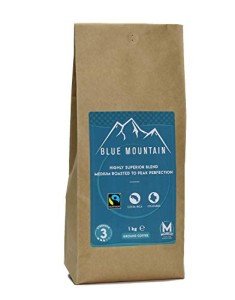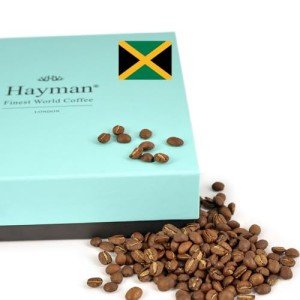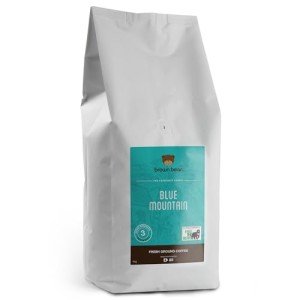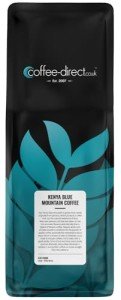Jamaican coffee beans are a real treat for coffee lovers. Grown in the lush Blue Mountains, these beans are known for their smooth flavor and delightful aroma. If you're after a unique coffee experience that's hard to beat, you’ve come to the right place!
Jamaican Coffee Beans
Experience the rich, vibrant flavors of authentic Jamaican coffee beans grown in the lush Blue Mountains
Product List


Fairtrade Blue Mountain Coffee 1kg
Moreish
Product Review Score
4.65 out of 5 stars
145 reviews$33.94

Blue Mountain Whole Beans
Hayman - Finest World Coffee
Product Review Score
4.95 out of 5 stars
191 reviews$109.99


Blue Mountain Medium Roast 1kg
Brown Bear
Product Review Score
4.3 out of 5 stars
121 reviews$33.73

Kenya Blue Mountain Coffee 908g
Coffee Direct
Product Review Score
4.79 out of 5 stars
146 reviews$45.87
Jamaica is known for its stunning beaches, vibrant culture, and mouthwatering cuisine, but one of its most significant claims to fame is its specialty coffee. Jamaican coffee beans, particularly those from the Blue Mountains, are considered among the finest in the world. The unique growing conditions, rich volcanic soil, and specific climate contribute to its distinctive flavor profile, making it a sought-after choice for coffee enthusiasts. In this blog post, we will explore the origins, characteristics, and impact of Jamaican coffee beans, as well as address some common questions about them.
The Origins of Jamaican Coffee
Coffee cultivation in Jamaica began in the mid-18th century when it was introduced to the island by the British. The favorable climate and altitude of the Blue Mountains created an ideal environment for coffee farming. Over the years, the island developed a reputation for high-quality Arabica beans, with coffee from the Blue Mountains emerging as the world’s most prestigious variety.
The Blue Mountain Region
The Blue Mountain Region, located between Kingston and Port Antonio, is renowned for its coffee production. This area’s unique microclimate, cool temperatures, and constant rainfall make it perfect for growing coffee. Cultivating coffee beans in this region is labor-intensive and can take several years, making Jamaican coffee not just a beverage, but also a craft that requires patience and skill.
| Feature | Details |
|---|---|
| Location | Blue Mountains, Jamaica |
| Altitude | 3,000 - 5,500 feet |
| Climate | Cool temperatures, high rainfall |
| Soil Composition | Volcanic soil with rich nutrients |
| Coffee Bean Variety | Arabica (Coffea arabica) |
| Harvest Period | November to March |
Characteristics of Jamaican Coffee Beans
Jamaican coffee beans are primarily composed of the Arabica variety, which is known for its delicate and complex flavor. The unique characteristics attributed to Jamaican coffee beans stem from their terroir – the environmental and cultural factors affecting the growth and quality of the coffee.
Flavor Profile
The flavor profile of Jamaican coffee beans encompasses sweetness, acidity, and a distinctive aroma. Below is a breakdown of some characteristic notes:
| Flavor Notes | Description |
|---|---|
| Sweetness | Caramel, honey, and fruity notes |
| Acidity | Bright, crisp, and lively |
| Body | Medium to full-bodied |
| Aftertaste | Smooth, with chocolate or nutty hints |
Unlike other coffees that may feature bold flavors, Jamaican coffee is often described as mild and balanced, providing a smooth drinking experience without overwhelming bitterness.
The Seven Types of Jamaican Coffee
- Jamaica Blue Mountain Coffee: The most famous type, known for its exceptional quality and high price.
- Jamaica High Mountain Coffee: Grown at slightly lower altitudes but still maintains strong quality.
- Jamaica Supreme: A secondary grade of Blue Mountain coffee.
- Jamaica Select: A high-quality coffee with a slightly lower elevation.
- Jamaica Extra (or Jamaican Prime): A good quality but less recognized than higher grades.
- Jamaica Coffee (Royal Blend): A mix often used in cafes, offers balanced flavors.
- Jamaica Coffee (Local): Represents small farms and lesser-known varieties, often enjoyed locally.
Cultivation and Sustainability
The process of cultivating Jamaican coffee beans is intricate. Farmers often use traditional methods that have been passed down through generations. This means many coffee beans are hand-picked to ensure only the ripest cherries make it to processing. Such meticulous care and attention help ensure the coffee quality remains high.
Challenges Facing Jamaican Coffee Farmers
Despite the rich heritage and demand for Jamaican coffee, farmers face modern challenges, including:
- Climate Change: Extreme weather patterns can affect crop yield and quality.
- Pest and Disease: Invasive species threaten the coffee plants.
- Economic Viability: Rising costs and fluctuating prices create difficulties.
Promoting Sustainability
To combat these challenges, many farmers are adopting sustainable practices, such as shade-grown coffee and organic farming methods. Moreover, initiatives to support local coffee cooperatives allow communities to thrive economically while preserving their cultural practices.
Table: Sustainable Practices in Jamaican Coffee Farming
| Sustainable Practice | Benefits |
|---|---|
| Shade-Grown Coffee | Promotes biodiversity and protects the ecosystem. |
| Organic Farming | Reduces chemical use and promotes soil health. |
| Fair Trade Agreements | Ensures fair wages for farmers. |
| Water Conservation | Protects local water supplies. |
FAQs about Jamaican Coffee Beans
Q1: What makes Jamaican coffee so special?
A1: The unique growing conditions in the Blue Mountains, along with traditional cultivation methods, contribute to the high quality, flavor profile, and limited production of Jamaican coffee.
Q2: How expensive is Jamaican coffee?
A2: Jamaican coffee, particularly Blue Mountain coffee, can be quite expensive, often ranging from £30 to £60 per pound, depending on the grade.
Q3: How can I identify genuine Jamaican coffee?
A3: Look for certificates of authenticity and packaging labels that confirm it is Jamaican coffee. Reputable sellers will often offer coffee with a certification mark, such as the "Jamaica Coffee Industry Board" seal.
Q4: What is the best way to enjoy Jamaican coffee?
A4: Enjoy it black to appreciate the complex flavors fully. Some prefer it with a splash of cream or sugar to balance the unique characteristics.
Jamaican coffee beans represent not only a beloved beverage but also a rich cultural narrative woven into the fabric of Jamaica. From the meticulous farming practices in the Blue Mountains to the smooth, complex flavor that coffee lovers cherish, the tradition of Jamaican coffee is one that deserves celebration and recognition. The challenges that farmers face and their commitment to sustainable practices offer valuable lessons in resilience and conservation.
As the world grows more interconnected, the opportunity to savor a cup of Jamaican coffee brings the experience of an island paradise right into your home, one sip at a time. Whether you are an aficionado or a casual drinker, understanding the heritage and unique characteristics of Jamaican coffee adds depth to every encounter with this delightful brew.